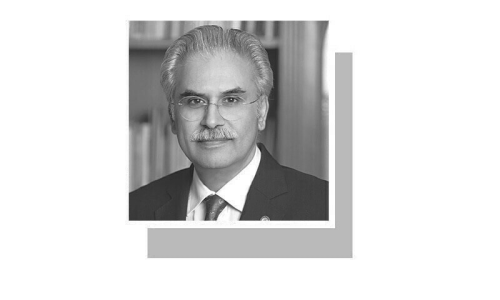PAKISTAN’S ethnic peripheries continue to burn. Working class households in peripheries and metropolitan areas alike continue to be strangulated by weekly inflation rates that top 40 per cent,and our militarised ruling class continues to loot, devastating already ravaged ecosystems, even as its members engage in palace intrigues in the lead-up to (s)elections.
Pakistan is not alone — more and more countries in our neighbourhood and world are increasingly militarised, inegalitarian and violent. But this is conveniently ignored when those who lead (and profit from) us gather for their annual shindig at the World Economic Forum in the dreamy Swiss resort town of Davos.
Our current caretaker prime minister, who is unlikely to enjoy another stint, has just returned from Davos. He and the rest of the delegation he headed enjoyed their time in the sun, while waxing lyrical (in Imran Khan-type fashion) about unparalleled media freedom in Pakistan and also signing some high-profile business deals with the Gulf monarchs.
All manner of business consultations and deals take place in Davos, featuring even those countries and corporations that are otherwise adversaries. Indeed, the caretaker PM and (newly minted enemy) Iran’s foreign minister had a meeting there. Meanwhile, a host of Muslim-majority and other country leaders hobnobbed with the Israeli president. And American corporate executives disclosed that they expect Donald Trump to be back in the White House by the end of the year and that capitalism would not be any worse off.
And therein lies the rub. Global capitalism continues to remain the game in town, and pretty much everyone who is rich and powerful continues to reinforce it. Yes, there are innumerable geopolitical conflicts, including genocidal wars, that litter the globe; but when push comes to shove, the world’s political and business leaders agree that the profiteering must continue unhindered, while making the occasional policy tweak here and there.
Do the world’s richest and most powerful people care?
Look at Palestine. Gaza has been reduced to rubble, but it is yesterday’s news. Business between the Israelis, neighbouring Arab countries, the Turks, and, of course, Western and Chinese superpowers, must carry on. Pakistan and Iran have been making headlines for their missile strikes, but by all accounts, the border remains open for the contraband that crosses both ways on a daily basis.
Beyond the everyday imperatives of keeping the compound growth cycle going, do the world’s richest and most powerful people who get together in Davos care about the medium- and long-term spectres of ecological breakdown and the prospect of mass upheaval due to ever intensifying class, ethnic and other forms of conflict? The answer, quite clearly, is no.
In case we forget, many of these same usual suspects gathered in the UAE for COP28 a few weeks ago. Almost laughingly, the climate summit was chaired by the head of the UAE’s state oil company. A vague agreement to phase out fossil fuels by 2050 toe-ended the event, but not before the said chair challenged scientists who link fossil fuel energy to climate change.
To put it bluntly, global summits like Davos and COP28 feature a whole lot of development-speak while essentially representing an opportunity for the rich and powerful to get together and plan how to split up the booty for the next 12-month cycle. This is not a cynical take. A cynical take is offered by those who believe the world will change because military-industrial establishments, propertied classes and corporate behemoths will develop an ‘elite consensus’ to do things differently.
To return to Pakistan, there is no evidence that any such ‘elite consensus’ is on the cards here except for the musical chairs, that is our khaki-coloured, patronage-based structure of power, to plod along, all players agreed on suppressing any fundamental challenge from below.
Let us not forget that Baloch women continue to sit in front of the Press Club in Islamabad waiting for anyone — including the mainstream parties who are currently in the establishment’s good books and are running campaigns to be (s)elected — to show up and at least acknowledge their existence.
The same could be said for the thousands who are on the streets of all major towns in Gilgit-Baltistan, or the hapless masses in Pakhtun tribal districts who face yet another wave of religious militancy. Or the ordinary working mass of people in cities and villages alike that are living through IMF-imposed austerity.
But the ruling class couldn’t care less. Just like respective ruling classes all over the world couldn’t care less about their respective populations. When legitimacy wanes, all of them know how to drum up jingoistic nationalism to fan the flames of hate. And then they all gather again in Davos to grease the wheels of profit.
The writer teaches at Quaid-i-Azam University, Islamabad.
Published in Dawn, January 20th, 2024












































Dear visitor, the comments section is undergoing an overhaul and will return soon.